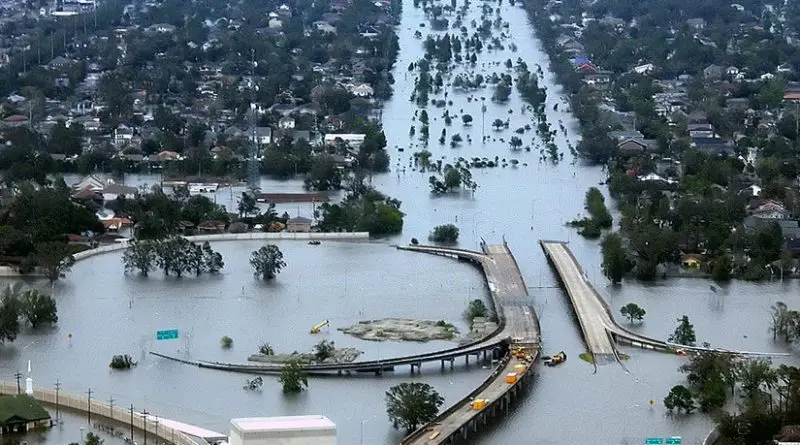Watch Spike Lee’s ‘When The Levees Broke’ For 10th Anniversary Of Hurricane Katrina – OpEd
I remember, ten years ago, being profoundly shocked by the almost indescribably inept response of the Bush administration to the aftermath of Hurricane Katrina, which struck New Orleans on August 29, 2005, and thinking that it showed two things above all: firstly, that racism remained a horrendous blight on the nation, as it was New Orleans’ poor and black population that suffered the most, and that, I was convinced, would be socially cleansed as the clean-up began; and, secondly, that this is what happens when governments put private profit and the slashing of federal budgets before the common good.
I recall, in particular, the tens of thousands of displaced residents crammed into the Superdome in apocalyptic fashion, as though the US was some sort of failed state, and the incongruous images of soldiers with guns treating citizens as criminal suspects as a humanitarian disaster engulfed the city because of incidences of looting in some of the few parts of the city that were not drowning.
In all, the flooding from Hurricane Katrina led to about 80% of New Orleans being submerged. More than 400,000 residents were displaced out of a total population of about 470,000, and 1,800 people died across the whole of the Gulf Coast hit by the hurricane. The economic cost was around $100bn, but figures don’t reveal the human cost of the destroyed and displaced lives, or, indeed, the cost to the credibility of the Bush administration, which callously showed the American people and the world how little it cared about poor black people in New Orleans.
A year after Katrina, I watched Spike Lee’s magisterial documentary film, “When the Levees Broke: A Requiem in Four Acts” uninterrupted on BBC4, which was so engrossing that I didn’t leave my seat for the whole of the four hours of the broadcast. Heartwarming in its humanity, as revealed in the recollections of its many residents interviewed by Lee in the weeks after the disaster, the film also shines an unerring light on the cost-cutting and incompetence involved in the city’s woefully insufficient flood protections, and on the incompetence of FEMA, the Federal Emergency Management Agency, whose competence had been fatally undermined under George W. Bush and the leadership of its unqualified director Michael D. Brown.
I believe the documentary is not only Spike Lee’s finest work, but one of the most important documentary films ever made about racism, inequality, and corrupt and inept government, and to mark the 10th anniversary of Hurricane Katrina, I encourage anyone who hasn’t seen “When the Levees Broke” to watch the documentary below, available in two parts via YouTube.
https://www.youtube.com/watch?v=12xj1sHvIWA
https://www.youtube.com/watch?v=9vuQKo_uuKE
Ten years on, 100,000 black people have indeed disappeared from New Orleans. Population statistics show that, from 2000 to 2103, the population has changed as follows.
- In 2000, the white population of New Orleans was 128,871; in 2013, this figure was 117,377
- In 2000, the Hispanic population of New Orleans was 14,826; in 2013, this figure was 20,849
- In 2000, the black or African American population of New Orleans was 323,392; in 2013, this figure was 223,742
Reconstruction has, of course, taken place extensively in parts of New Orleans, and tourism has almost returned to pre-Katrina levels, but poorer, predominantly black areas like the Lower Ninth Ward have not recovered. As the Guardian noted in an article about New Orleans’ “uneven recovery and unending divisions,” which included an interview with Ronald Lewis, a retired streetcar worker who runs the House of Dance and Feathers, “a miniature museum of New Orleans community culture dedicated to the marching groups that form parades for occasions such as Mardi Gras”:
[T]he Lower Ninth is still a section of New Orleans defined by absence. The neighbours who died or never came back. The stores and services that no longer exist. Those who had no savings or were unable to negotiate the labyrinthine insurance and compensation processes and were submerged by bureaucracy.
A walk along Tupelo Street, where Lewis lives, is the Lower Ninth in a nutshell: some repaired houses, some new ones and some that are wooden skeletons, abandoned wrecks buried amid chest-high weeds. The waves subsided long ago but their consequences never did.
In a country still wracked by racism — discernible in the disproportionate number of black men in prison (around 13% of the US population is African American, but African Americans made up around 40% of the 2.3 million prisoners in the US in 2009), and in the impunity with which black men are killed by the police — the legacy of Hurricane Katrina is another reminder of how, although a black man is president, the US continues to be dogged by a disturbing and fundamental racism.
Note: Also of interest on this anniversary is the Guardian‘s article, “10 years after the storm: has New Orleans learned the lessons of Hurricane Katrina?”
– See more at: http://www.andyworthington.co.uk/2015/08/31/watch-spike-lees-when-the-levees-broke-for-the-10th-anniversary-of-hurricane-katrina/#sthash.KfClT977.dpuf

